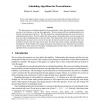Free Online Productivity Tools
i2Speak
i2Symbol
i2OCR
iTex2Img
iWeb2Print
iWeb2Shot
i2Type
iPdf2Split
iPdf2Merge
i2Bopomofo
i2Arabic
i2Style
i2Image
i2PDF
iLatex2Rtf
Sci2ools
CORR
2006
Springer
2006
Springer
Scheduling Algorithms for Procrastinators
This paper presents scheduling algorithms for procrastinators, where the speed that a procrastinator executes a job increases as the due date approaches. We give optimal off-line scheduling policies for linearly increasing speed functions. We then explain the computational/numerical issues involved in implementing this policy. We next explore the online setting, showing that there exist adversaries that force any online scheduling policy to miss due dates. This impossibility result motivates the problem of minimizing the maximum interval stretch of any job; the interval stretch of a job is the job's flow time divided by the job's due date minus release time. We show that several common scheduling strategies, including the "hit-the-highest-nail" strategy beloved by procrastinators, have arbitrarily large maximum interval stretch. Then we give the "thrashing" scheduling policy and show that it is a (1) approximation algorithm for the maximum interval stretc...
CORR 2006 | Education | Maximum Interval Stretch | Online Scheduling Policy | Optimal Off-line Scheduling |
Related Content
| Added | 11 Dec 2010 |
| Updated | 11 Dec 2010 |
| Type | Journal |
| Year | 2006 |
| Where | CORR |
| Authors | Michael A. Bender, Raphaël Clifford, Kostas Tsichlas |
Comments (0)

